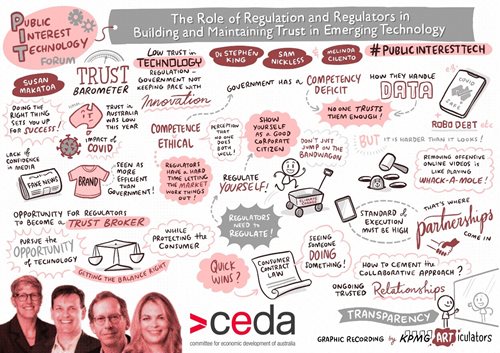PROGRESS 2050: Toward a prosperous future for all Australians
06/12/2020
A seemingly universal observation through COVID-19 has been that organisations have significantly  accelerated the roll-out, take-up and use of technology. Everything from digitally enabled work from home to digital AGMs, to telehealth. Crisis has made this acceleration a necessity, but when you see the benefits, from the ease of distribution of board papers, to enabling participation in AGMs, to the delivery of valuable health services – the pace at which we have managed to change with, begs the questions: what took so long and where to next?
accelerated the roll-out, take-up and use of technology. Everything from digitally enabled work from home to digital AGMs, to telehealth. Crisis has made this acceleration a necessity, but when you see the benefits, from the ease of distribution of board papers, to enabling participation in AGMs, to the delivery of valuable health services – the pace at which we have managed to change with, begs the questions: what took so long and where to next?
Rossana Bianchi from KPMG, Joe Sofra, Managing Director for G4S ANZ and Catherine Maxwell from the Governance Institute helped unpack the implications of recent tech trends, the experience of rapid digitisation through COVID-19 and what this has meant for how we think of and manage risk.
Rossana highlighted five key trends that have been important (including through COVID-19) and which are critical in how we maintain momentum in the adoption of emerging technology for economic and social good. These are:
- Demystification of technology: COVID-19 has increased exposure to digitally enabled products and services, lifted awareness and perhaps curiosity about new technologies and their potential to deliver benefits.
- The digital divide: In some cases, COVID-19 has accelerated the democratisation of technology and lowered the costs for accessing essential services (eg telehealth). In others, COVID-19 has exacerbated the digital divide. ‘Edtech’ is an example, where many children do not have access to technology or a suitable learning environment at home.
- Reinvent vs rebuild: We have the opportunity to innovate to reinvent and transform our societies to make them more resilient to future crises and cycles of disruption. The question is whether the focus now will be on rebuilding existing business models or reinventing them for the future.
- Digital ethics: We are seeing an increasing focus by the public and policy makers on the unintended and unforeseen impacts that technology can have on people if not adequately governed. There is still a lot of work to do with AI and in the context of other critical technologies.
- Tech everywhere: Tech is everywhere and there is much focus on needing to adopt to keep up, but adoption needs to be backed by a strong business case for tech investments, how they are going to be governed, implemented, and used to transform the business to deliver better outcomes for the business and customers.
Joe spoke to how G4S undertook some extreme experimentation and demystified technology, to use it to drive a critical business transformation through COVID-19. As a provider of justice services, G4S manages prison facilities, and in particular the maximum-security Port Phillip prison which houses around 1000 male prisoners. As COVID-19 hit, Joe explained G4S were confronted with the need to cease personal visits, and what that would mean for those in the prison from a health and safety perspective. Faced with this challenge G4S was able to move quickly to the utilisation of digital technologies to enable prisoners to stay in touch with their families through ‘virtual visits’. They adopted basic, but bespoke tablet technologies to achieve this, and managed the risks of inappropriate use of technologies (for instance prisoners contacting victims) through the “old school” approach of manual, personal observation and control. While not the most efficient, it was effective under the circumstances.
Joe emphasised that while the acceleration of this approach was COVID-19 led, the benefits are potentially far greater than those related to the immediate need. Fundamentally use of digital technology enables prisoners to connect with family and loved ones in a different way – with their families relaxed in their home environments. Joe believes this different level of connection and greater number of connections with family members has the potential to support reduced recidivism, delivering benefits to the individual and their family, enhancing community safety and wellbeing, breaking the cycle of disadvantage and reducing costs to government.
Absent the pandemic Joe believes they probably would have ‘chipped away’ at this opportunity. G4S now has considerable data to enable them to step back and design for purpose and enable greater benefits through more purposeful design.
How we maintain momentum in the beneficial use of technology is important in the context of recovery in Australia. Rossana highlighted five critical issues to focus on:
- Building digital literacy, which is low in Australia (we are not alone). Critical if we want to become a leading digital nation;
- Addressing digital inclusion;
- Developing holistic and future looking approaches especially as technologies increasingly intersect (or converge as Michelle Price spoke to on day one);
- Engage with community, including through a tech for good agenda; and
- Building centres of excellence and cross sectoral collaboration and coordination to inform policy makers on what good looks like, risks and concerns and additional ‘governance’ requirements eg Centre for Digital Ethics and Innovation in the UK.
Risk management, risk appetite and risk aversion are all important in the context of retaining and building momentum in the adoption and use of emerging technology.
Catherine noted that the demystification of digital tech had been important through COVID-19 and that technology had been used to a far greater extent than before in enabling governance -think virtual board meetings, AGM and digital voting, use of drone technology to enable remote site inspections etc. Now attention will need to shift to the governance of technology. The challenges here will be resourcing and capability and maintaining focus on emerging technologies like AI at the Board level. These are not set and forget issues.
Joe observed that G4S, by its nature is not a risk avoiding business. The issue is to avoid being ‘risk dumb’. If you don’t understand the risks, you will say no too often. The opportunity now is for G4S to be risk smart, take a step back and learn from this year’s experiences, and manage risks and opportunities effectively in an ongoing way. The organisation has learned how to innovate at pace and that is probably what they want to retain, to avoid testing and re-testing to the extent that the technology and opportunities have moved on.
Watch this discussion
KPMG live-scribe

CEDA's PIT Forum was supported by our Foundation Partners:



